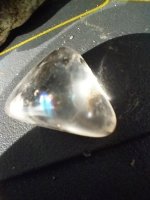Goldwasher
Gold Member
- May 26, 2009
- 6,077
- 13,225
- 🥇 Banner finds
- 1
- Detector(s) used
- SDC2300, Gold Bug 2 Burlap, fish oil, .35 gallons of water per minute.
- Primary Interest:
- All Treasure Hunting
I would like to see pictures as well.
Something interesting to point out... A good number of ski resorts operate on what is on and within National Forest operating under a lease . That lease actually affects operating dates...
When there is a good season sometimes those resorts have to ask the Forest Service to operate paste those dates.
I love to snowboard I worked at several ski resorts.......talk about surface disturbance!!!!
A lot of well healed environmentalists love to ski....snowboard and enjoy the resorts and areas that are sometimes near mining areas... Alta, Utah...Crested Butte...Gunnison.... Mammoth Mountain Ca. and more ....
funny how people don't care when they're having fun.........disturbance compared to other forest users.....Ha ha
I heard a story today about people that were protesting a big shell oil rig that was set to go to Ak.......
"PADDLE IN THE BAY"
talking about the environment and climate change....fossil fuels.......drilling for oil...
and they interview the guy who is leading the protests.....a guy in a PLASTIC KAYAK!!!!!!!!!!!!...A.K.A a MORON...where does plastic come from DUDE ??....lame answer RECYCLING BRO!!!!!!!!!!
??....lame answer RECYCLING BRO!!!!!!!!!!
he will post his protests on social media and drive a car back to his house....as will all of the other protestors...
Miners are horrible OMG!!!!!!!!!!!!!!!!!!!!
man this crap is annoying
Something interesting to point out... A good number of ski resorts operate on what is on and within National Forest operating under a lease . That lease actually affects operating dates...
When there is a good season sometimes those resorts have to ask the Forest Service to operate paste those dates.
I love to snowboard I worked at several ski resorts.......talk about surface disturbance!!!!
A lot of well healed environmentalists love to ski....snowboard and enjoy the resorts and areas that are sometimes near mining areas... Alta, Utah...Crested Butte...Gunnison.... Mammoth Mountain Ca. and more ....
funny how people don't care when they're having fun.........disturbance compared to other forest users.....Ha ha
I heard a story today about people that were protesting a big shell oil rig that was set to go to Ak.......
"PADDLE IN THE BAY"
talking about the environment and climate change....fossil fuels.......drilling for oil...
and they interview the guy who is leading the protests.....a guy in a PLASTIC KAYAK!!!!!!!!!!!!...A.K.A a MORON...where does plastic come from DUDE
 ??....lame answer RECYCLING BRO!!!!!!!!!!
??....lame answer RECYCLING BRO!!!!!!!!!!he will post his protests on social media and drive a car back to his house....as will all of the other protestors...
Miners are horrible OMG!!!!!!!!!!!!!!!!!!!!
man this crap is annoying






